 |
Friday the Labor Department disgorged a mountain of ugly unemployment data. Another``surprising'' jump in joblessness made headlines.
iTulip has observed and analyzed changes in the US economy for over ten years. In the current economic cycle, since 2006, we have focused on median duration of unemployment to give us early warning of rising unemployment.
Here we extend that analysis to point us to where unemployment is headed overall and also delve into 14 major industry sectors, including one you work in, to fine tune our forecast.
There is no doubt in our minds that this is The Big One -- a depression is all but certain unless the US develops and executes a post WWII scale stimulus plan starting in 2009, but the structure of that stimulus is critical to avoid turning the US into a sclerotic economy dominated by large corporations and big government. In any case, we forecast 10 million jobs lost by the end of next year.
NOTE: Janszen Interview on CBC News: Sunday, Airs Nov. 9th, 2008 @9:40 AM (EST) debates the government bailout of Big Three automakers.
A mass layoff is the event of at least 50 persons let go by a single employer. Mass layoff events and initial claimants for unemployment insurance September 2007 was 1,307. For September 2008 it increased 57% to 2,269.
iTulip member PHS posted the following report on Friday from Pa. It gives us on-the-ground evidence of the impact.
Since 1990, I have served as a pastor in the UCC (Obama's former denomination) in central Pa. Never in the past 18 years have I had sooo many people call me for assistance. What was once rare now happens several times a week. These people aren't just passing through either. They live in the community. "My electric has been turned off." "We're out of food and the food bank told us to call the local churches." "I've never been layed-off before, I'm really ashamed to call you but we're behind on our bills." ...and so on. I believe that 10 million are now called "unemployed." This is what some of them look like. I suspect this figure will rise significantly over the next year or so. I suspect that I'll be hearing from some of them too.
All across the country the recession hammers the most vulnerable members of American society. Here are today's food pantry related headlines from Google News:Mayor warns food pantry shelves near empty
Indianapolis Star, United States
Unemployment Up, Donations Down; Food Pantries Struggling
Hartford Courant, United States
Food pantries strained with rising demand
WZZM, MI
Need Rising For Area Pantries, Soup Kitchens
Jamestown Post Journal, NY
Salvation Army's food pantry may re-open
The Morning Journal, OH
Can-do attitude: Food pantry scrambles to keep up with needs
Maryville Daily Times, TN
Food bank will hold raffle for food
abc7news.com, CA
Salt Lake Tribune, United States
Food bank low on supplies - November 7, 2008
6abc.com, PA
Oshkosh Salvation Army: More families are requesting help with the ...
Oshkosh Northwestern, WI
Food pantry levels running low
Lexington Clipper Herald, NE
Area food pantries low on supplies, support
Ledger Independent, KY
93.1 WIBC Indianapolis, IN
Tough times mean we must dig deeper
Beaufort Gazette, SC -9 hours ago
Indianapolis Star, United States
Hartford Courant, United States
WZZM, MI
Jamestown Post Journal, NY
The Morning Journal, OH
Maryville Daily Times, TN
Food bank will hold raffle for food
abc7news.com, CA
Salt Lake Tribune, United States
6abc.com, PA
Oshkosh Northwestern, WI
Lexington Clipper Herald, NE
Ledger Independent, KY
93.1 WIBC Indianapolis, IN
Tough times mean we must dig deeper
Beaufort Gazette, SC -
Recession or depression?
A year ago October 4, 2007 we wrote Next Wall Street "surprise" is more bad employment news to show why median duration of unemployment matters:
We've been tracking the duration of unemployment numbers because they, combined with other data, are a decent leading indicator of future unemployment, especially at economic turning points.
Early in an economic slowdown, six months or more before the lay off employees, companies slow then stop new hiring. As thousands of employers cut new hiring, any worker who is laid off finds that finding a new job takes longer and longer.
At some point the process becomes self-reinforcing; the longer more people stay unemployed, the more spending and consumption is reduced, the more demand declines, the more pressure on firms to reduce head count rises, and so on.
We noted then a strong correlation between rising duration of unemployment and recession. Below is the chart from a year ago. Early in an economic slowdown, six months or more before the lay off employees, companies slow then stop new hiring. As thousands of employers cut new hiring, any worker who is laid off finds that finding a new job takes longer and longer.
At some point the process becomes self-reinforcing; the longer more people stay unemployed, the more spending and consumption is reduced, the more demand declines, the more pressure on firms to reduce head count rises, and so on.
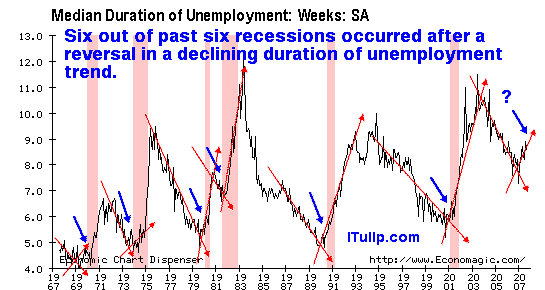
The duration of unemployment chart updated with Friday's data, below, confirms our forecast.
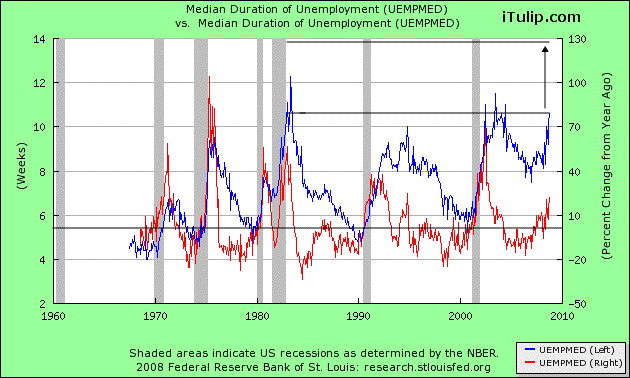
Since our Oct. 2007 report, median duration of unemployment increased from nine to 11 weeks. We see it rising above the 12-week level last seen in 1983 to 14 weeks but likely higher before the recession ends.
What does an analysis of each major sector of the US economy tell us about where this recession is going?
Industry Sector Analysis Spells "Depression"
One of the competitive strengths of the US economy over other countries in the world besides sheer size is its industry and geographic diversity. While recessions in a particular state or industry can been deep and long lasting, such as the oil bust in Texas in the early 1980s that followed 1970s boom, recessions tend to be relatively short and mild across the nation as a whole; if employment in one industry or state is contracting, individuals and families can move to another state where a growing industry is creating new jobs. However, if major industries are declining in all states at the same time a recession can turn into a full blown depression. This has not happened since the 1930s, and if not for major infrastructure programs that built the US highway system and a housing boom after WWII, a repeat of the post WWI depression, that followed the end of that period of war spending, may have recurred in the late 1940s.
In our previous unemployment analysis Housing Bubble Correction Update: Here comes the jobs crash we focused on unemployment by state. The data revealed a stark picture of unemployment rising in every large state in the nation.
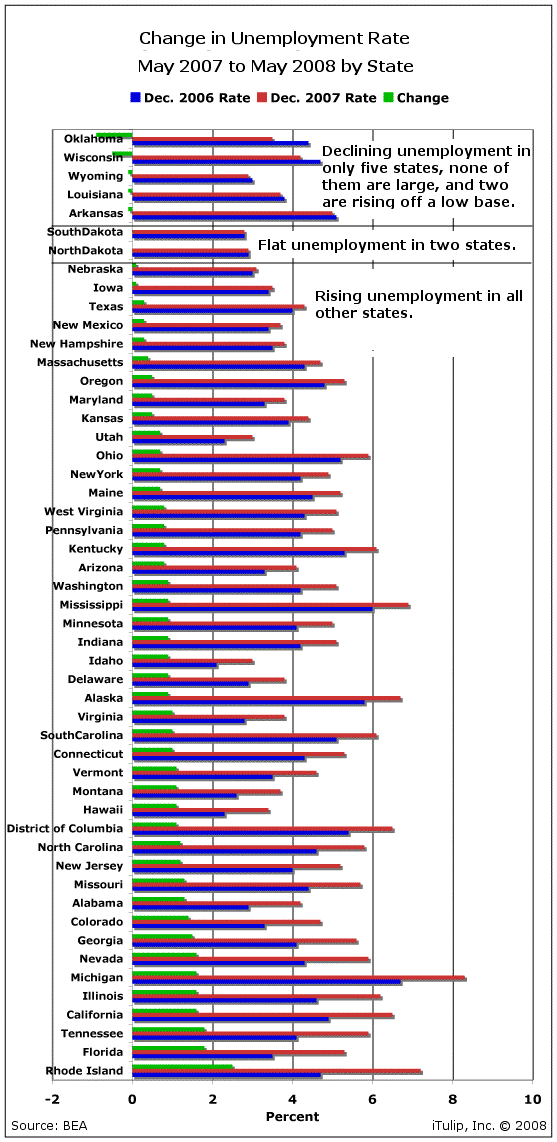
Unemployment growth by state, May 2007 to May 2008
In this analysis we look at the 14 major industry sectors tracked by the US Department of Labor to see how various sectors are faring and where the job growth is, if any. Unfortunately, a disturbing picture of jobs losses across all major industries, resulting in millions of job losses in 2009 with few areas for optimism in the private sector, emerges. First, the summary charts.

Unemployment rising in every major sector of the US economy
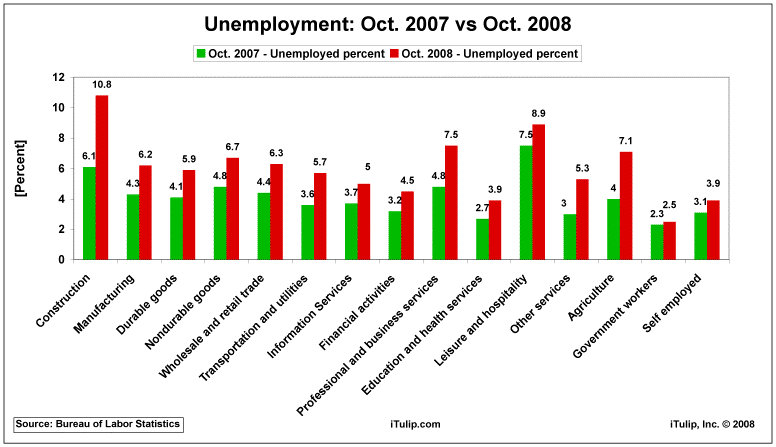
On a percentage basis, construction, and leisure and hospitality, and professional services are taking the biggest hits so far.
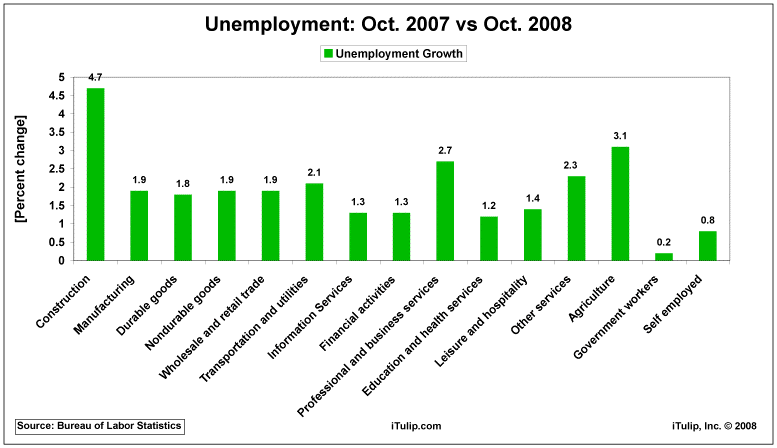
The largest percentage increase in unemployment occurred in construction, agriculture, and professional services.
Unemployment by Industry
We start our detailed sector analysis with Information Services. Computer and telecommunications software and hardware design and manufacturing comprises this sector.
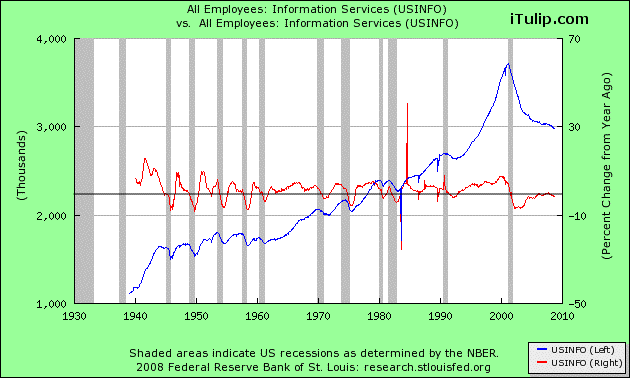
Information Services: Employs 3.7 million

Chinese exports of computer and telco gear pre and post
technology stock bubble
With global demand for technology products falling in 2009, we expect to see between 200,000 and 400,000 more jobs lost in the IS sector by the end of 2009.
Where did many of the unemployed US high technology workers go after 2001? As you'd expect, as the housing bubble and the finance industry that financed it grew, employment the Finance, Insurance, and Real Estate (FIRE) sector and construction sectors expanded, too.
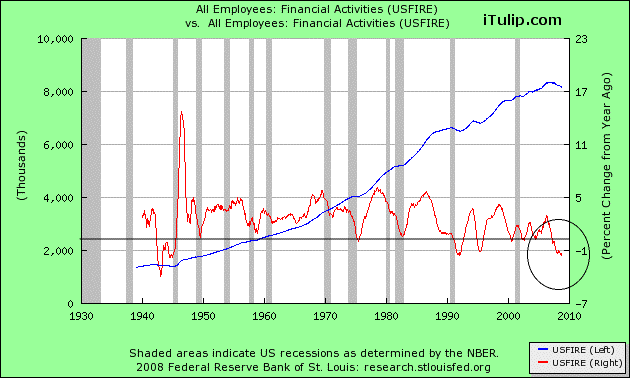
FIRE Economy: Employs 8 million
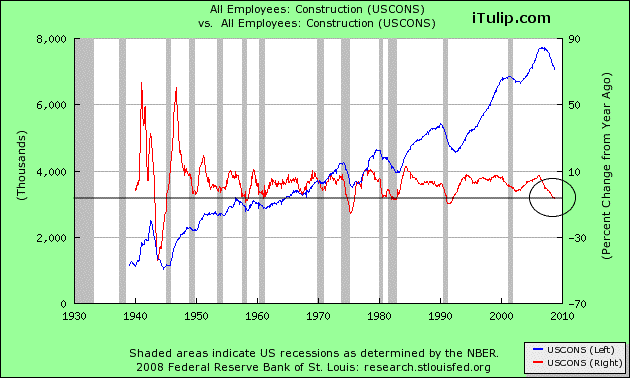
Construction: Employs 7 million
Construction grew strongly after the 2001 recession as the housing and commercial real estate bubbles fueled the creation of approximately 800,000 jobs. More than half of those jobs have been lost since the housing bubble started to collapse in 2006. As the commercial real estate bust joins the residential real estate crash that started in 2006, we expect to see another 600,000 to 1.2 million jobs lost in the Construction industry by the end of 2009.
The following eight industries in addition to the three noted above are either experiencing, or are near, negative growth and will continue to shed jobs next year.
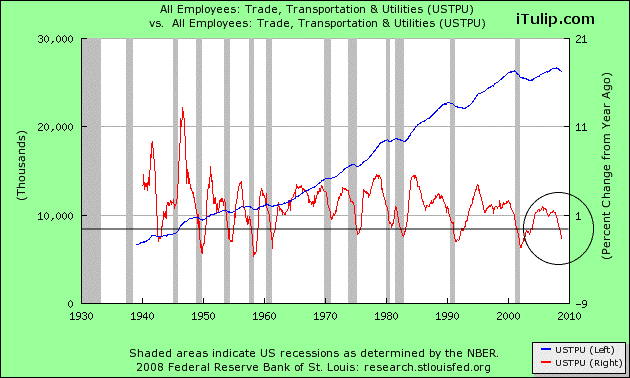
Trade, Transportation and Utilities: Employs 27 million
This enormous industry sector includes Wholesale Trade and Retail Trade (below). Sales and distribution businesses include Motor vehicles dealers, Home furnishing outlets, Computer and software distributors and resellers, and the all important Alcoholic beverages retailers known as liquor stores -- in fact everything that consumers do not buy directly from manufacturers. In addition to hits in demand from faltering businesses and consumers, these businesses are sensitive to the credit contraction because inventories are often floated on bank credit lines.
Among iTulip's 12,000 plus members are many wholesale and retail business owners around the world who have for the past few months reported both difficulty obtaining credit and staggering declines in unit orders and revenue, often exceeding 50% or more year to date.
What began earlier this year as a credit crunch and recession, weakened demand turned into a vicious feedback loop of declining orders, diminished cash flow, reduced ability to meet debt payments, layoffs to reduce expenses, leading to a further decline in demand across the economy.
We foresee a 10% to 15% decline in the Trade, Transportation and Utilities sector with losses of 2.7 million to 4 million jobs in 2009.
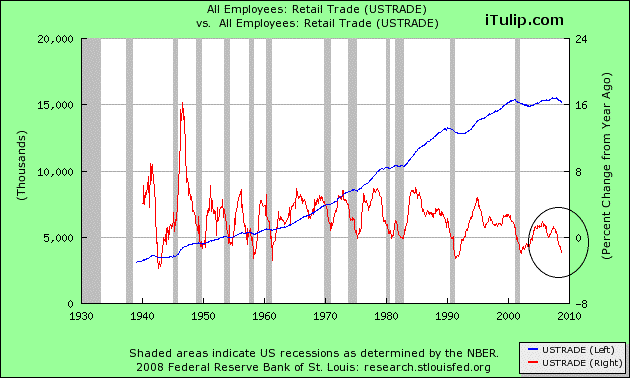
The Retail Trade sector is taking the brunt of declining household incomes and consumer confidence, now at an all time low, before filtering up to the Wholesale level, covered next. Retailers reported collapsing sales in October and we expect the holiday season to be even worse than the most pessimistic forecasts that project the worst sales in 17 years. The delayed impact on employment in the sector will not show up until Q1 2009 after many retailers that need holiday sales season to turn a profit for the year–to put them "in the black" -- will not see the revenue they need from the worried and unemployed. Tens of thousands of retailers will go out of business. We will not be surprised to see employment in Retail Trade fall by 10% to 15% by the end of 2009, shedding 1.5 to 2.25 million jobs.
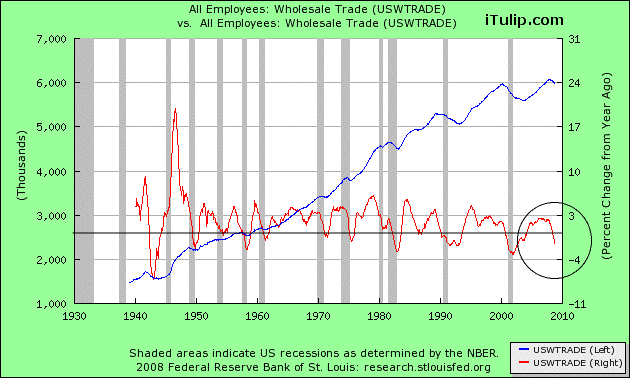
Many wholesalers in the Wholesale Trade sector will not survive the consumer and business sales crash that will continue through next year. Look for a 10% to 15% loss in jobs by the end of 2009, translating into 600,000 to 900,000 million jobs disappearing. Add other sub-sectors and we forecast total jobs lost by Trade, Transportation and Utilities in 2009 between 2.7 and 4 million.
We believe that the impact of this depression will be a restructuring of the entire global consumer economy much as the collapse of the technology bubble in 2000 changed the structure of that industry and its trade relationship with the rest of the world between 2001 and 2004. After the collapse of the credit-based US consumer bubble is over, the retail consumer sector as a whole will never be the same again. This worldwide economic contraction will ultimately result in a realignment of global trade and capital flows overall. The US will lose access to its traditional sources of financing for its trade deficit and will need to re-build its export earnings and national savings before reentering the global market as a significant consumer in five to ten years.
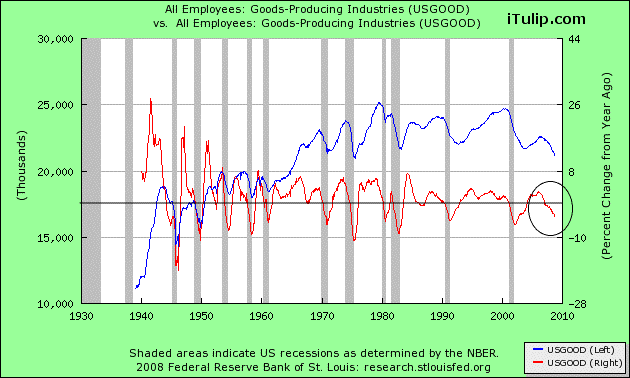
Goods Producing: Employs 22 million
The Goods Producing sector includes Construction discussed above and Manufacturing, of which Durable Goods Manufacturing is a part, detailed below. This is the "making stuff" sector that at its height in 1979 before the birth of the FIRE Economy employed 26 million Americans providing 36% of all jobs before finance began to crowd out many productive industries, leaving the Goods Producing sector providing 19% of all jobs today. In fact, today the Goods Producing sector is actually smaller than the US Government payroll of 23 million. Jobs in this sector are now contracting at a 5% negative rate and we expect a 10% to 15% decline in 2009 resulting in 2.2 to 3.3 million jobs lost.
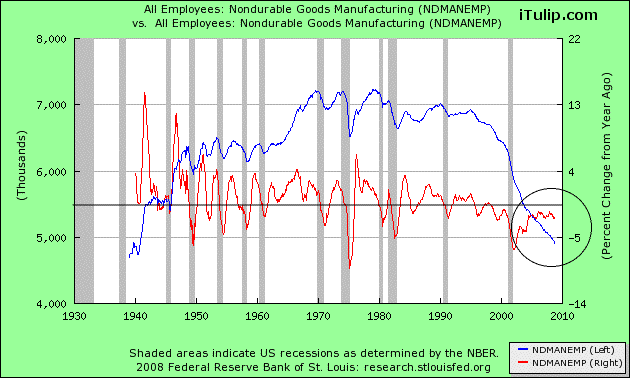
Durable Goods Manufacturing: Employs 5 million
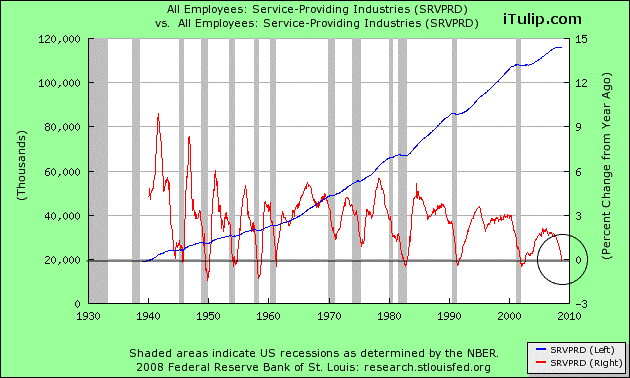
Among iTulip's 12,000 plus members are many wholesale and retail business owners around the world who have for the past few months reported both difficulty obtaining credit and staggering declines in unit orders and revenue, often exceeding 50% or more year to date.
What began earlier this year as a credit crunch and recession, weakened demand turned into a vicious feedback loop of declining orders, diminished cash flow, reduced ability to meet debt payments, layoffs to reduce expenses, leading to a further decline in demand across the economy.
We foresee a 10% to 15% decline in the Trade, Transportation and Utilities sector with losses of 2.7 million to 4 million jobs in 2009.

Retail Trade: Employs 15 million
The Retail Trade sector is taking the brunt of declining household incomes and consumer confidence, now at an all time low, before filtering up to the Wholesale level, covered next. Retailers reported collapsing sales in October and we expect the holiday season to be even worse than the most pessimistic forecasts that project the worst sales in 17 years. The delayed impact on employment in the sector will not show up until Q1 2009 after many retailers that need holiday sales season to turn a profit for the year–to put them "in the black" -- will not see the revenue they need from the worried and unemployed. Tens of thousands of retailers will go out of business. We will not be surprised to see employment in Retail Trade fall by 10% to 15% by the end of 2009, shedding 1.5 to 2.25 million jobs.

Wholesale Trade: Employs 6 million
Many wholesalers in the Wholesale Trade sector will not survive the consumer and business sales crash that will continue through next year. Look for a 10% to 15% loss in jobs by the end of 2009, translating into 600,000 to 900,000 million jobs disappearing. Add other sub-sectors and we forecast total jobs lost by Trade, Transportation and Utilities in 2009 between 2.7 and 4 million.
We believe that the impact of this depression will be a restructuring of the entire global consumer economy much as the collapse of the technology bubble in 2000 changed the structure of that industry and its trade relationship with the rest of the world between 2001 and 2004. After the collapse of the credit-based US consumer bubble is over, the retail consumer sector as a whole will never be the same again. This worldwide economic contraction will ultimately result in a realignment of global trade and capital flows overall. The US will lose access to its traditional sources of financing for its trade deficit and will need to re-build its export earnings and national savings before reentering the global market as a significant consumer in five to ten years.

Goods Producing: Employs 22 million
The Goods Producing sector includes Construction discussed above and Manufacturing, of which Durable Goods Manufacturing is a part, detailed below. This is the "making stuff" sector that at its height in 1979 before the birth of the FIRE Economy employed 26 million Americans providing 36% of all jobs before finance began to crowd out many productive industries, leaving the Goods Producing sector providing 19% of all jobs today. In fact, today the Goods Producing sector is actually smaller than the US Government payroll of 23 million. Jobs in this sector are now contracting at a 5% negative rate and we expect a 10% to 15% decline in 2009 resulting in 2.2 to 3.3 million jobs lost.

Durable Goods Manufacturing: Employs 5 million
Durable Goods is just what it sounds like, composed of goods that you use over and over, such as lawn mowers, but don't use up, like beer. This sector has been in steep decline since the mid 1990s. Its fate was sealed by the 2001 recession when the nascent trend of outsourcing of manufacturing to low wage countries became the primary cost efficiency tool employed by struggling US consumer and business brand manufacturers, turning them into design, marketing and distribution companies. We see no reason why this recession will not continue to create additional major job losses in this sector resulting in a 500,000 to 1 million reduction in employment.

Service: Employs 118 million
When you think of the Service sector you may think of restaurants and hair salons, but this sector includes every business that does not produce a physical product, including health care, legal, design, and security companies. Professional Services, detailed below, and the FIRE sector, discussed earlier in this analysis, are large sub-sectors of Services. The sector recently stopped producing jobs and we expect it will contract by 2.5% to 5% and by 3 to 6 million jobs in 2009 with some of the job losses in the Private sector compensated by gains in the Government sector.
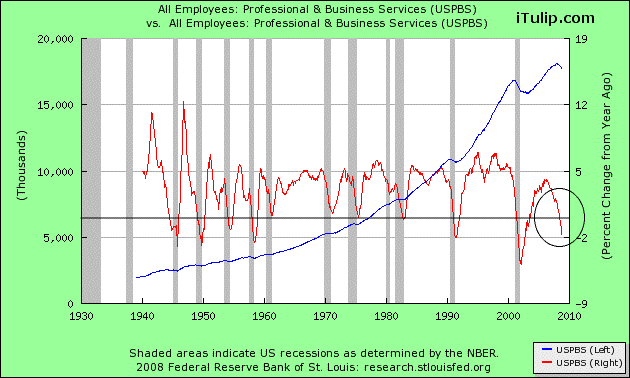
Professional Services: Employs 17 million
The Professional Services sector has already given up over a million jobs since peaking in 2006 and this trend will accelerate in 2009 with 2.5 to 5 million jobs lost.
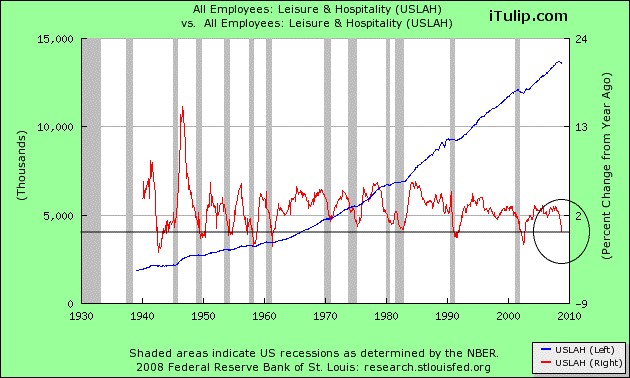
Leisure and Hospitality: Employs 4 million
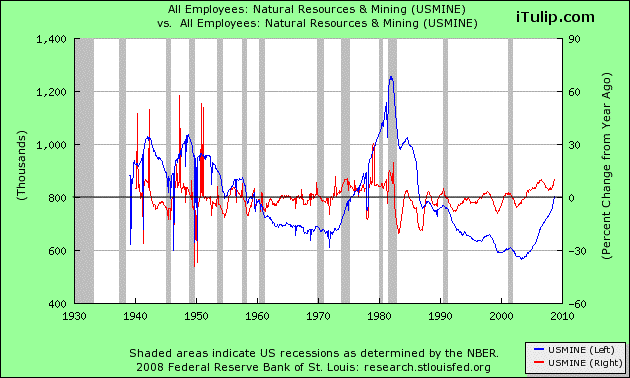
Mining: Employs 800,000
Mining does not employ many people in the US but we added it to show an industry that has enjoyed rapid job growth since 2002 when the dollar started to weaken and commodities priced in dollars -- that is, all of them -- began to rise. The strong dollar, falling demand, and loss of access to credit to finance new mining operations will create mining industry job losses of 20% or more in 2009.
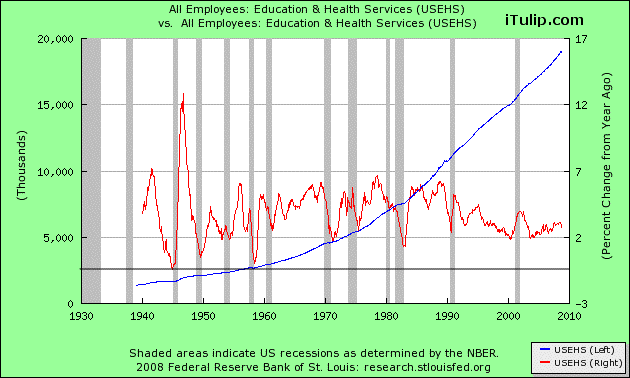
Education and Health Services: Employs 19 million
The Education and Health Services sector is largely immune to recession in the past and we do not believe this recession will prove an exception. Jobs will not increase but if there are losses they will tend to be modest.
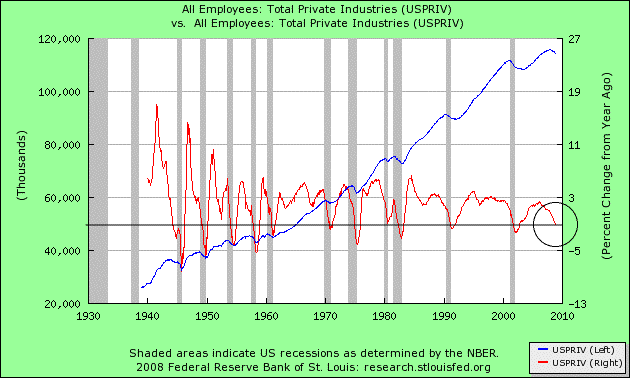
Total Private Sector Employment: Employs 118 million
Overall, the entire private sector of the US economy is experiencing zero job growth and will be more negative in 2009 than during any recession since 1983.
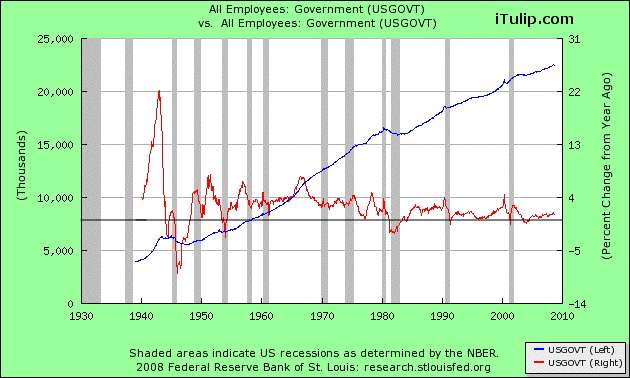
Total US Government Employment: Employs 23 million
One area of jobs expansion that we can count on in this recession is the US Government sector and goods and services companies that produce for it. Construction, security, health care, and technology are industries that may benefit from a wide array of infrastructure spending programs that will be created to slow the recession over the next few years.
Solutions
While the start date of the current recession has still not been officially announced, we believe it started on a nominal basis, not adjusted for inflation, in Q2 2008, and on a real growth basis in Q4 2007, as we forecast in Q4 2006. One striking aspect of this recession is that unemployment, a lagging indicator that peaks after the end of a recession, is rising so quickly.
What can the government do to slow or stop the various feedback loops that are reducing demand and creating unemployment in the US economy? Is the loss of 10 million or more jobs in the US economy next year inevitable?
Can the Federal Reserve cut interest rates to stimulate borrowing and spending?
The Fed has already cut the Fed Target Rate to 1% and the Effective Fed Funds Rate is close to zero. There is no more monetary expansion ammo.
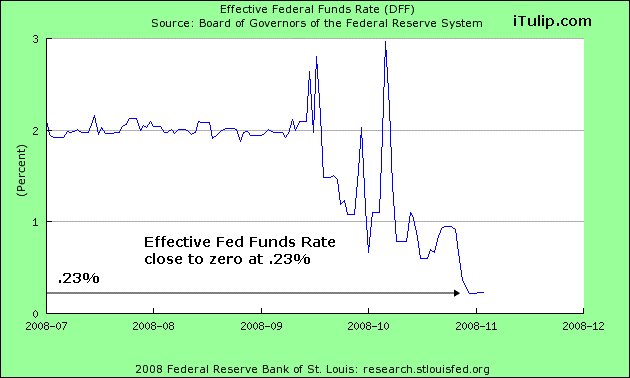
Effective Fed Funds Rate is close to zero percent
Can consumers and businesses borrow to compensate for lost income with credit?
The 2001 recession was shortened by the expedient of households borrowing against the inflating value of their homes using cash-out refinancing of mortgage loans from 2002 to 2006. Now that home prices are falling and credit is tightening, no similar trick can be executed today to turn an illiquid asset like a home into cash. Rule changes to allow savers to tap their 401K and pension funds are in the works. However, this relatively limited stock of seed corn can not make much of a dent in the cash shortage that is only just beginning to hit US households. The 50th percentile and down of US households have no money in 401K and Keogh plans versus $96,000 in home equity at the start of the 2001 recession. The 75th percentile has only $15,000 in 401K funds compared to $222,000 in home equity at the start of the last recession. For the vast majority of US households, there is simply no savings or equity left to tap.
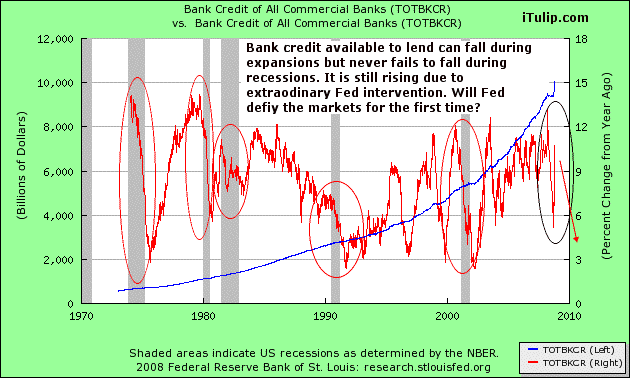
Bank credit can decline during economic expansions but has never failed to decline during a recession. It's possible that it is "different this time" and that bank credit can continue to expand as this recession progresses. However, we believe credit is more likely to decline as the recession deepens as it always has, further reducing the purchasing power of businesses and consumers and feeding into the recession process.
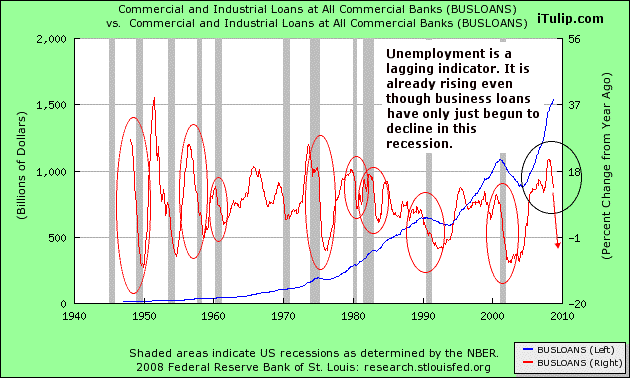
Borrowing declines during recessions. Business loans rolled over in early 2008 and we believe have a long way to go before bottoming.
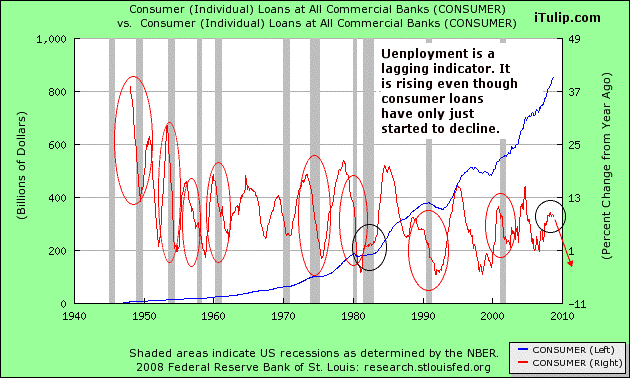
Similarly, consumer loans have only just begun to slow. What is striking is the rapid declines in business activity even before actual lending contracted in the household and business sectors. This means that contracting credit has not yet contributed significantly to the recession process. Perhaps central banks can think of a way to cut this process short, but a ready source of illiquid capital to covert to cash is nowhere in sight.
Can the US can depreciate the dollar and export its way out of trouble?
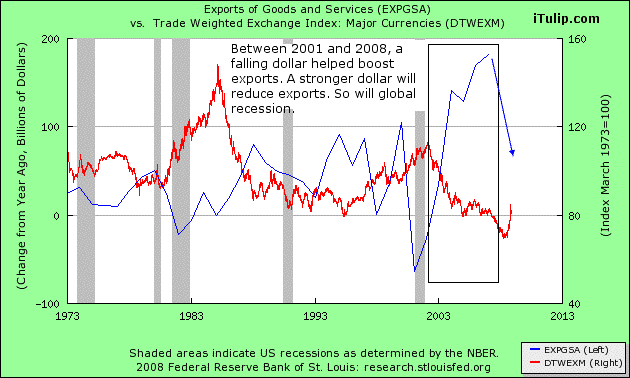
A weak dollar since 2001 helped the US grow export revenue by hundreds of billions of dollars per year from 2000 to 2008. With the dollar strengthening and global demand falling, that source of economic growth is no longer available. We do expect the US to take measures to depreciate the dollar but for the purpose of increasing inflation expectations.
The US is out of monetary, currency, and credit tricks to play to halt the current recession to prevent it from turning into a depression. The only tools left are fiscal, and the sooner the US deploys them the better the chances that a depression can be avoided.
Conclusion
In total we see the US economy losing between seven and 13 million jobs by the end of 2009 representing a 5% to 10% increase in unemployment. Our forecasts during this crisis have tended to be on the optimistic side; steeper job losses cannot be ruled out, especially if other feedback loops intensify. For example, rising unemployment will lead to a further 20% to 40% decline in real estate prices as households lose access to income to pay mortgage debt. A further tightening of credit as the pool of credit-worthy borrowers contracts means even deeper losses in Wholesale Trade, leading to more unemployment, and so on.
The proximate cause of the current depression is the sudden disappearance of the purchasing power that was created by the expansion of credit in the US economy since 1980. Since 1980, the US economy went from needing a dollar of new private and public sector borrowing to produce a dollar of GDP growth to dependence on more than five dollars of new debt to generate a dollar of GDP growth by 2007. This credit growth was accomplished by various unsustainable means, including foreign borrowing, financial engineering, and leverage.
Since net capital inflows slowed to a stop in 2007, launching a financial crisis associated with capital flows and "sudden Stop" economic effects, first US then international credit markets seized up in 2008. The US government through the Federal Reserve and Treasury Department have attempted to restart the flow of private credit in the US but with only limited success. The inexorable logic of the American political economy dictates that the next phase of economic remediation is direct substitution of government credit for private credit by lending directly to private firms, such as the loans to US auto makers now being discussed. We believe this lending will be broadly expanded throughout the economy in 2009 as the depression deepens, with certain industries and sectors tending to benefit more than others and other unintended consequences drastically changing the structure of the US economy.
We also believe that the structure of proposed loans to US auto manufacturers is the litmus test for government support of US industries in this depression. Our industry sector analysis tells us that the crisis in the US auto industry is the tip of the iceberg. Many other goods producing and service industries will follow.
The backbone of the US economy is not its large manufactures but its many thousands of small goods and services businesses where the innovation occurs that moves America forward. While bailouts of large financial and manufacturing companies are debated in Congress, who is speaking for the small businesses that not only maintain America's competitiveness but traditionally pull the US economy out of recession in the past? Where is their bailout? The unintended consequence of dealing with insolvent employers on a first come, first serve based on size is that small, innovative businesses will be less able to compete with the large, sclerotic corporations.
One thing leads to another. Future bailouts of private companies are likely to follow the pattern of the first bailouts. Given that US budget is not infinite, what set of principles should be used to prioritize and structure government assistance to private industry? What form it should take? The answer lies in the kind of economy we want after the economic crisis ends. Do we want an economy in five years dominated by a few large, internationally uncompetitive companies or many small innovators that can improve American productivity, efficiency, and competitiveness?
The social consequences of the kind of mass unemployment we foresee will, if not addressed by government stimulus, split the nation into competing interest groups by age, income group, and industry that will fight for decades over a shrinking pie that could be growing if all of these groups were working together to achieve a common goal: an efficient, competitive economy based on productivity, savings, and investment. Doing nothing is not an option. On the other hand, the course we are on today of ad hoc bailouts going to the biggest, most vocal, and best politically connected, first in banking and now in the auto industry, will lead to an economy of big corporations and big government, and a decade or more of economic stagnation may follow.
Flawed economic stimulus policy from 2001 to 2003 produced the world's first fiscal stimulus program executed in reverse order -- the housing bubble -- with jobs first and government spending second. We don't need to pile another set of flawed government programs on to cope with the fallout from the last. America was built on innovation and trade. Bailouts of large companies need to be balanced with capital gains and income tax cuts that allow the dynamic sectors of the US economy to continue to grow the economic pie for all.
iTulip Select: The Investment Thesis for the Next Cycle™
__________________________________________________
To receive the iTulip Newsletter or iTulip Alerts, Join our FREE Email Mailing List
Copyright © iTulip, Inc. 1998 - 2007 All Rights Reserved
All information provided "as is" for informational purposes only, not intended for trading purposes or advice. Nothing appearing on this website should be considered a recommendation to buy or to sell any security or related financial instrument. iTulip, Inc. is not liable for any informational errors, incompleteness, or delays, or for any actions taken in reliance on information contained herein. Full Disclaimer
Comment